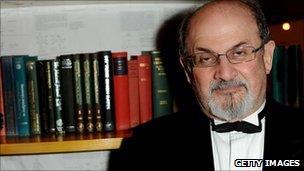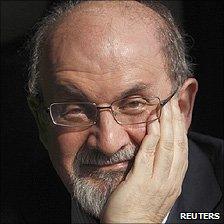Talking Books: Salman Rushdie
- Published
The BBC's Razia Iqbal speaks with author Salman Rushdie
He has written 11 novels, essays and collections of short stories, yet Salman Rushdie is still best known for two books.
The first is Midnight's Children, which made his reputation, and the second is The Satanic Verses, which prompted riots and deaths around the world when many Muslims believed he had blasphemed against the prophet Mohammad.
The controversy resulted in a fatwa being issued against him by the then Iranian leader, Ayatollah Khomeini, calling for his death.
That, in turn, led to Rushdie going into hiding for nearly a decade.

Luka and the Fire of Life is Rushdie's second book for children
He has written many novels since then, to mixed critical acclaim. Now he has written his second book for children - Luka and the Fire of Life.
When I met Salman Rushdie, for the Talking Books programme, I worried about what frame of mind we would find him in.
Having interviewed him a few times previously, I was aware that he can be a tad moody. However he walked in, full of beans, but with a very sore hand.
He had just signed one thousand copies of his new book at the London bookshop Hatchards.
The book he was signing was written for his son Milan, (whose middle name is Luka), in the way that his first children's book, Haroun and the Sea of Stories was written for his older son, Zafar (whose middle name is Haroun).
Life after the fatwa
Haroun and the Sea of Stories was written in the wake of the fatwa in 1989. It was about Rashid, the storyteller, who has lost contact with the Sea of Stories. His son, Haroun, reconnects his father to the source of his inspiration.
Rushdie produced this moving book at a time when his friends were defending his right to freedom of speech in newspapers and interviews.
The book was Rushdie's personal defence of the freedom of the imagination - not just freedom of speech - in his inimitable, inventive way. For many people, it is among his finest works.
The new book is about the power of storytelling and among its inspirations are mythology and computer games.

Salman Rushie "beamed with pride" about his new work
Rushdie is obviously beaming with pride about the book and told me his son was delighted with it. Some critics have loved it, others have been less enthusiastic - an experience common to Rushdie since the huge impact he made with Midnight's Children.
I asked him if he resented this, given that he has written so many novels since Midnight's Children but he said he was humbled by the success of the book, and said would that every author could have one book which resonated with readers beyond one generation.
The book was voted the Booker's Booker twice, when the prize was 25 years old and again when the prize celebrated its 40th anniversary.
Interestingly, though, not all readers who think they should read a Rushdie novel start with Midnight's Children.
Many young people in the United States (Rushdie is a visiting lecturer at Emory University) start with his novel about the US, Fury.
And what about The Satanic Verses, the novel, as opposed to the controversy - about which reams and reams is known.
Is is a source of regret for him, that the novel just disappeared amidst the rights and wrongs of publishing it, of freedom of speech and the freedom to offend.
He said that, finally, the novel was being read for itself and a new generation of readers were attracted to it, some even basing PhDs on the material.
The interview ranged from life after the fatwa to what his knighthood meant to him, how he will always be interested in the everyman figure of the migrant and what his critics think of him.
I left the interview thinking that whatever critics think about Salman Rushdie, he is rarely short of interesting things to say about the world, its politics and the only ever so smaller world of storytelling.
Salman Rushdie will be on Talking Books on the BBC News Channel on 17 October at 2230BST and on BBC World on 23 October at 0330, 0830 and 2030BST.